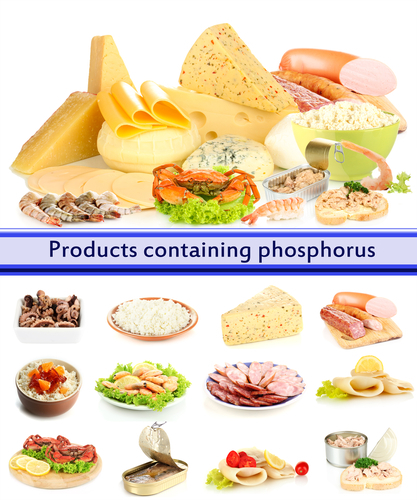Is Phosphorus Bad For You?
Also Known As: P (periodic table)
Short answer
Phosphorus is not only good for you, but it is mandatory for appropriate function. It is important, however, not to consume too much phosphorus, as high levels can lead to unwanted side effects.
Very healthy and numerous health benefits. A few harmful qualities may be associated, but only under certain circumstances such as an allergic reaction.
View Full Grading System
Category 'A'
Very healthy and numerous health benefits. Side effects are rare. Things rated an 'A+' are typically necessary for survival (for example, water).
Very healthy and numerous health benefits. A few harmful qualities may be associated, but only under certain circumstances such as an allergic reaction.
Very healthy and numerous health benefits. Harmful qualities may be associated, but aren't usually serious.
It is important to note that even the best things in life can become bad in immoderate amounts. So, although something may be rated an 'A+', overconsumption/overdoing can bring unwanted effects.
Category 'B'
Very beneficial to your health. Things rated a 'B+' may have a few harmful qualities to pay attention to.
Overall beneficial to your health. Things rated a 'B' may have some harmful qualities to pay attention to.
More beneficial to your health than not. However, harmful qualities are most likely associated and shouldn't be overlooked.
The main difference between category 'A' and category 'B' is the harmful qualities typically present in 'B' items. Serious side effects are usually uncommon, but are still possible and should be taken note of.
Category 'C'
Both beneficial and harmful qualities associated. Things rated a 'C+' are typically a bit more on the beneficial side. Still, moderation is important.
A fairly even ratio of beneficial and harmful qualities. Moderation is important. Very general topics that can lean towards both sides of the spectrum will be placed here as well. Rice, for example, can be good or bad depending on the type.
More harmful than beneficial. Side effects are common, especially when consumed/done excessively. Moderation is very important.
Category 'C' usually denotes to both good and bad qualities. When it comes to this category, it is important to keep this word in mind: moderation.
Category 'D'
Harmful to your health. Although benefits may be associated, the bad most likely outweighs the good. Moderation is very important.
Harmful to your health. A few benefits may be associated, but the bad outweighs the good. Moderation is extremely important.
Harmful to your health. Very few, if any, benefits are present. Things in this category should be avoided as much as possible.
Category 'D' is typically for things that are more harmful than beneficial. While consuming/doing something unhealthy once in a blue moon shouldn't hurt, we definitely recommend eliminating 'D' items as a regular part of your routine/diet.
Category 'F'
Category 'F' is for things that fail to bring anything beneficial to the table, and are very harmful to your health. We recommend completely avoiding anything in this category. Long-term side effects of 'F' items are usually very serious.
Category 'N'
'N' stands for neutral. Things placed into this category are generally (a) neither good nor bad for you, or (b) lack the necessary evidence to reach any conclusions.
Long answer
Phosphorus is a natural mineral found in milk, grains, and foods rich in protein. Approximately 85% of the phosphorus in the human body exists in bones and teeth, contributing the strength of these structures. The remaining 15% exists in tissues and cells throughout the body.
Everybody needs an appropriate level of phosphorus in their body to function at the optimal level. This mineral aids in several body processes and functions; it assists kidneys in filtering waste, it is vital in the formation of DNA to store new information, it balances your body's pH level, it helps the heart and other muscles contract, it assists in the storage and use of energy, and it plays a role in transmitting nerve signals throughout the body.
However, phosphorus can be harmful in high doses. Too much phosphorus in the body can result in muscle pain, itching / red eyes, constipation, nausea, vomiting, diarrhea, and increased risk of cardiovascular disease. To avoid high levels of phosphorus in the blood, nobody should supplement their diets with phosphorus unless recommended by their medical provider (typically to treat low levels of phosphorus in the blood, calcium based kidney stones, or high blood calcium levels); and patients suffering from kidney failure should consult their medical providers about limiting their intake of phosphorus.
Possible short-term side effects
- high doses can cause:
-
itching / red eyes
-
muscle pains
-
constipation
-
nausea
-
vomiting
-
diarrhea
Possible long-term side effects
- cardiovascular disease (again, only from overconsumption)
Benefits
- improved kidney function
-
improved muscle function
-
improved nerve function
-
strengthen bones / teeth
-
balance ph
-
improved storage / use of energy
-
helps in formation of dna
Please turn your Ad Blocker off to see this content. Thank you!
Thank you for your feedback!
Written by Rachel Adams
Published on: 12-28-2015
Last updated: 12-10-2016
Thank you for your feedback!
Written by Rachel Adams
Published on: 12-28-2015
Last updated: 12-10-2016


 Approved by
Approved by 














